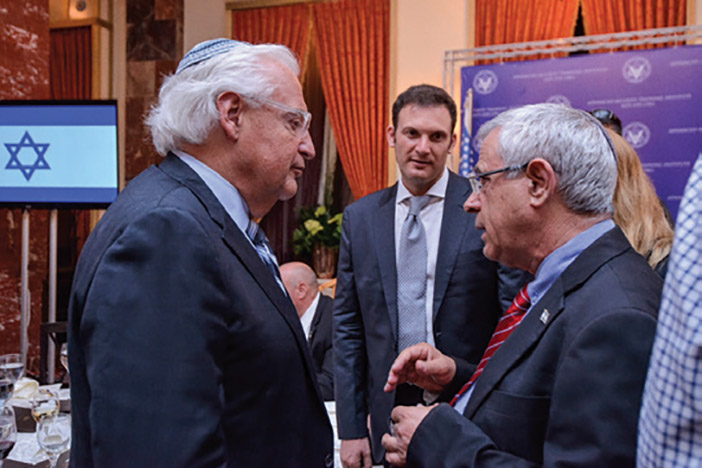



Often described as the front line for democracy, Israel has long served as a learning opportunity for American political and security leaders to meet, learn and apply the lessons back home. The close cooperation between fire, medical and police personnel in both countries also extends to the local level, thanks to the U.S.-based Advanced Security Training Institute. “It changes how they serve their communities. They bring back what they’ve learned,” said ASTI founder and president Yisroel Stefansky.
On June 27, ASTI celebrated having trained 300 American emergency responders since its founding in 2003, with a gala dinner at the King David Hotel. In turn, these 300 returned home to train another 7,000 colleagues in the Israeli emergency response methods. The event featured Ambassador David Friedman, several Knesset members and representatives of local law enforcement agencies who were in Israel that week. “We are fighting for the same cause, defending the same civilizations, with the same values and same beliefs. We are you, you are us,” said MK Michael Oren, the former Israeli ambassador to the US.
For thousands of counties, municipalities, fire districts and police precincts across the US, a visit to Israel is as important in their work as it is for the military and other federal agencies. Commander Guillermo Rivera of the Washington, DC, Metropolitan Police Department’s Special Operations Division, noted that when multiple local, state and federal personnel confront an emergency, teamwork and cooperation are vital. The way that Israeli agencies work together serves as a model for American responders.
Through ASTI’s Israel Immersion Program, participants learn how Israel confronts hostage situations, terrorist tunnels and arson, among other things. The idea for ASTI dates back to the 9/11 attacks, when Stefansky, the Jerusalem-born son of American olim, sought to bolster cooperation between the two countries through joint training programs. “The police spokesman charged me to take care of visiting delegates. I asked them what they wanted to learn, and then connected them to Israeli personnel,” said Stefansky. “I kept developing it and I can say that ASTI is the Harvard of security education.” At the time, he served as a ZAKA volunteer and Israel was in the midst of the Second Intifada.
Among the local officials at the dinner was Michael Guditus from the Emergency Management Department in Fairfax County, Virginia. Speaking to JNS, he noted the similarity of the terror tunnels on the Gaza border to the drug smuggling tunnels on the US-Mexican border. “What you see in Israel first, you then start seeing in America,” he said. Closer to his home, he spoke of the 2010 hostage situation in suburban Maryland where a disturbed armed man took three hostages. After a four-hour standoff, the gunman was killed, without injury to the hostages. “What we learned in Israel is how to work together as a cohesive team, and those techniques were used to render that situation safe,” said Guditus. “The fact is, what we learned from Israelis saved lives there [in Maryland].”
Along with police, ASTI has also proven valuable to firefighters combating massive forest fires in western states. When the hills around Haifa were ablaze in late 2016, ASTI participants watched the Israeli response and applied it to similar fires in California. Likewise with fires that had an intentional cause. “With kites and balloons carrying explosives, we take visitors to the Gaza border to show how Israel addresses arson. If it ever comes to that in America, they are now trained as a result of their experience in Israel,” said Stefansky.
“Whether it’s the kite bombs or drones used in attacks, seeing it here lets us know one day it could come to us,” said Rivera. “The networking here—and the Israeli people sharing their experiences—is of utmost importance.”
By Sergey Kadinsky










